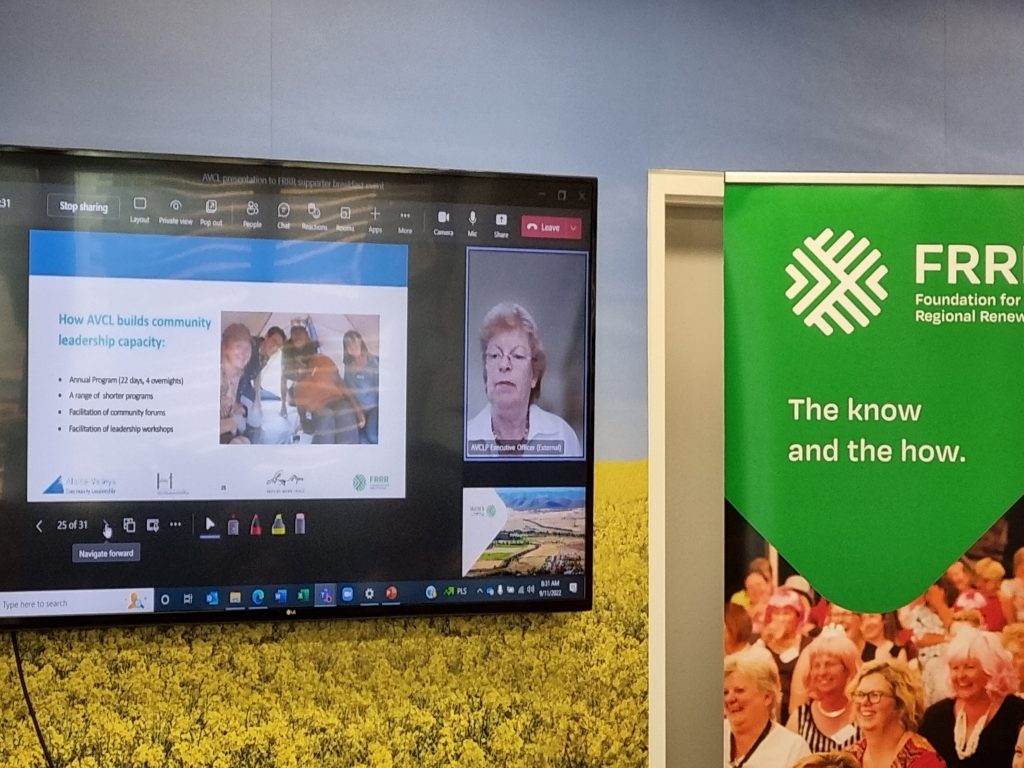Event: 29 November 2022
In November, around 25 supporters joined the FRRR directors, CEO and Partnerships Team for a donor event held at the Nutrien Ag Solutions offices in Docklands, Melbourne. Dialling into the event as a guest speaker was Jacqui Bramwell from Alpine Valleys Community Leadership (AVCL) program.
Based in the Alpine Valley in north east Victoria, AVCL is dedicated to supporting their region by building strong leadership among locals, to create thriving, connected and resilient communities.

Back in 2019/20, the Alpine Valley was heavily affected by the Black Summer bushfires. The fires destroyed homes, livestock, 3,387km of fencing, and in the Alpine Shire 30% of the shire footprint had some of the worst air quality in the world, causing smoke taint on the grapes in the many local wineries.
For these communities in the north east, recovery took many forms. Immediate recovery needs included finding food and shelter for displaced people and repairing fences to keep livestock contained. But as time passed, recovery needs changed and the focus turned to the future.
In 2021, AVCL received a $90,000 multi-year grant from FRRR, through the Bushfire Recovery Fund, funded by the Helen Macpherson Smith Trust (HMSTrust) and the Sidney Myer Fund. The grant was to build their capacity to strategically plan and deliver leadership training that will effectively support and build community recovery in the area.
This FRRR grant program supports not-for-profit community groups who play a central coordinating or networking role in supporting communities to recover from the Black Summer bushfires and to build organisational capacity.
Jacqui joined the meeting to share progress to date in implementing their grant and to provide some insights into the ongoing recovery.
A key goal for AVCL was to develop a recovery component in their organisation’s strategic plan, including developing specific workshop programs and resources and to make them more accessible to community members.
To understand what the broader community needed, they started by consulting widely. They connected with their 500 alumni across the north east region. They also contacted local authority Recovery Managers and Neighbourhood Centres who are well connected within their communities to hear first-hand what locals need.
“The key themes from those consultations were the challenges around supporting and sustaining community-led recovery. For the community to lead the recovery process, they need to have the leadership and project management skills,” Jacqui explained.
She noted that the scale of the recovery has affected all other activities in the Shires, taking community leaders away from other organisations they are normally active in.
“In this region, there are up to 10 Community Recovery Committees due to the vast impacts of the fires and the geography. That means a lot of people. This highlights the importance of building the next generation of leaders to backfill those positions on the committees of organisations such as CWA, the SES, the local cemetery management committee etc. Improving the leadership skills of more people can help to expand the reach of recovery efforts and strengthen the future of community more broadly.
Another aspect that Jacqui highlighted was the need to be proactive and consider future sustainability of the region. Some communities have told AVCL that they want to take a bigger view, in the face of rapid climate change and the intensity and frequency of these events. They are interested in transformational change, such as considering changing a community’s economic base.
To support local leaders through this, they have arranged trips to other communities that have had to transform, such as Derby in Tasmania, which has evolved from a mining community into an adventure-based tourism community, attracting thousands of people. These trips are an important opportunity to explore how to take it from being a concept to being a reality. Hearing directly from the people that have driven that in a community where it’s worked is important for them. They can take those lessons on board as to how to drive that sort of change in their own communities.
Over the next two years, the remaining funds will go towards actually delivering these resources and learnings to local communities.
“AVCL will coordinate leadership development in governance, project management and other specific leadership skills requested, ideally attracting other funding so the training can remain free or at only nominal cost.”
We look forward to sharing what else they learn as this project continues to roll out.

